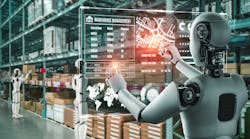The global supply chain crunch that has gripped the world since the onset of the COVID-19 pandemic is being exacerbated by the Russian/Ukraine conflict. The Biden administration followed through on its threat to cut energy supplies from Russia, which may put oil prices well over $300 per barrel. Gasoline and diesel prices are primed to soar. According to the AAA gas price tracker, the average price for a gallon of diesel is already up to $4.25 per gallon, a 14 cent increase in less than a week. Economists estimate that the U.S. government will report a February inflation rate of nearly 8%, an acceleration from the prior month that would only partially capture the recent run-up in energy prices. It will affect every aspect of modern life. Business leaders will be forced to make quick decisions and take immediate actions to sustain business operations.
Suppliers, manufacturers, shippers and retailers—the main players in the supply chain system—are already out of sync from the pandemic. The last two years played havoc with production of goods, shipping and logistics that took its toll. Supply chain disruptions, port congestion, capacity shortages and increasing freight rates challenged shippers, ports, carriers and logistics providers throughout 2021. The supply chain disruption was evidenced across the globe and felt locally.
In the face of the pandemic, businesses should have built long-term resilience plans for managing future challenges that took into consideration potential risks across the entire value chain, but a Russian invasion of Ukraine was probably not on anyone’s radar. However surprising, the repercussions from it cannot be ignored. Resilience is more important now than ever. All players at each link in the supply chain will need to find a middle ground between just-in-time manufacturing and the impending realities of higher prices, more scarcity of materials and even tighter labor markets—all of which will be further impacted by higher fuel prices.
Because globalization is the underpinning of most supply chains, recovery from this newest blow will take a combination of human ingenuity, a stout strategy and advanced technology that can help run the gauntlet. At the most fundamental level, companies will need to reduce downtime, ensure quality and increase flexibility so they can respond to future demand patterns as effectively as possible. Strong data and analytics capabilities are crucial in understanding complexity, anticipating current and potential disruptions, and quickly developing responses.
The Ultimate AI Testing Ground
AI-based supply chain management solutions are powerful instruments that can help tackle the current, inimitable challenges that companies have had thrust upon them. They are applicable throughout the supply chain by better equipping companies needing to address constraints and disruptions of business operations, from purchasing to delivery of goods. AI-enabled technologies touch every aspect of the supply chain ecosystem, from product design to manufacturing processes to delivery at customers’ doors. It increases efficiency, reduces the impact of the worker shortage, and improves logistics. It is a game-changing and essential technology in the face of the current state of global affairs. Getting the most out of them, however, requires taking organizational steps to capture the full value from AI.
For manufacturing, AI-powered predictive insight tools can analyze vast quantities of sensor data on production and other operational assets and unlock the value from unstructured data in maintenance logs and similar documents. By leveraging AI and machine learning technology, manufacturers can adopt a predictive maintenance approach through monitoring and analysis of historical sensor data that can optimize and lengthen the life of critical equipment. Data models can also be used to create a complete, up-to-date picture of the state of operations. This intelligence helps identify ways to improve production processes and other actions that require a well-orchestrated plan to maximize efficiency while ensuring high levels of quality.
Logistics is a sector that has inefficiencies, but nothing like the issues being experienced today. This environment is a test of the resilience of the global trading system. A flawless delivery requires seamlessly moving goods from overseas factories to U.S. addresses. Ocean freighters, shipping containers, cargo terminals, truckers, chassis providers and railroads must all work together to avoid delays along the chain.
Given the current environment, logistics providers must have a firm grip on freight rate fluctuations, potential delays and bottlenecks, and the possibility of War Risk Surcharges if they service war zone ports. It also requires having the ability to make necessary adjustments in real-time. Shippers that use the Internet of Things (IoT) can track the mechanical health and location of goods in shipment, and AI-enabled end-to-end visibility allows them to respond more effectively to changes in demand and logistics.
Following are some of the ways AI can help mitigate current supply chain disruptions.
Cognitive Automation
Cognitive automation—AI applied to automate specific supply chain processes—creates the opportunity to produce more with less human interaction. Its applications can make real-time recommendations, predict outcomes that prevent cognitive biases, make autonomous supply chain decisions, and create self-driving supply chain innovative technologies. Cognitive automation can transform manual, repetitive tasks into highly automated processes with exceptional performance.
Forecasting for Process Optimization
Predictive insights provide the opportunity to forecast key performance measurements, thereby anticipating customer behavior. Advanced planning solutions sense changes in demand and supply to accelerate the ability to respond. Although predicting delivery routes is not always feasible in the current environment, it enhances communication between supply chain participants and calls out disruptions to the supply chain.
Supply Chain Resilience
AI technology is used to learn and then illustrate how to manage kinks in the supply chain. AI facilitates a “self-healing” supply chain dataset that rests on the premise that the best plan is useless if unexpected events occur. This could not be more relevant than now. Supply chain resilience identifies and corrects data issues in real-time, which creates nimble and flexible organizations. AI adds end-to-end control to enable real-time visibility of supply chain performance, risks and opportunities for better informed end-to-end decisions.
Addressing the Skills Shortage
The traditional supply chain operating model is inflexible, slow and cumbersome. It relies heavily on unskilled and skilled labor. AI and advanced analytics can take the place of some low-skilled and tedious jobs such as material handling and inventory control, and some skilled labor such as those tasks that focus on statistical and predictive modeling and analysis. AI facilitates forward-looking, strategic decision-making and end-to-end segmentation that cuts complexity and accelerates responsiveness.
In recent years, executives who introduced AI into their supply chains reported decreased costs and increased revenues. This year, it will take significant investment and work to find an acceptable new normal where market demand can be met so that it doesn’t create excess strain and put price pressures on other players in the supply chain cycle.
Most certainly, AI will not fix all issues facing the supply chain, but supply chains that use AI will be lightyears ahead of those that do not.
Cory Rhoads is vice president of sales with SparkCognition, a provider of artificial intelligence solutions. He helps many of the world’s top consumer brands deploy and scale AI solutions to achieve new levels of operational excellence, quality and efficiency. Prior to joining SparkCognition, he served as strategic sales director for Medallia, VP of sales for SAP, and senior account executive for CallidusCloud. He also held management and business consulting positions with Oracle and Accenture. He currently serves on the board of directors for Circle Christian School and the Stetson University Business School.



